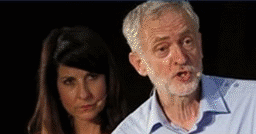The polls have closed, the votes have been counted...
...and Jeremy Corbyn wins on the first ballot by a country mile (59.5% in a four-horse race is almost unheard-of). Straight up.
Naturally I wanted to have a full breakdown of the voting, because I am a total nerd, but I couldn't quite get everything I wanted. Nevertheless, enough for some interesting stats.
Estimates of votes cast were way off, of some 540,272 eligible voters, 422,664 valid votes were cast, so a much higher turnout (78.2% rather than yesterday's 61% estimate - I thought at the time it sounded very low) than was thought.
First preference votes:
Andy Burnham: 80,462 votes, 19.04%
Yvette Cooper: 71,928 votes, 17.02%
Jeremy Corbyn: 251,417 votes, 59.48%
Liz Kendall: 18,857 votes, 4.46%
Makes my 54% prediction (which was my most optimistic) on the first ballot look a bit pathetic really. But that's because I was still somehow convinced that some party apparatchiks would do something, to somehow stop this happening. But they didn't.
Needless to say, I'm quite excited. Plus, Tom Watson easily won the Deputy Leadership and although Jeremy's had 32 years of parliamentary experience, it's all been from the back benches, whereas Tom has been involved with the "party machine" extensively, so they should complement one another: I think they'll make a good team. That I happened to put £20 on Tom Watson at 6/4 a few months ago is immaterial here (actually, it is specifically material, in that it is a £30 profit).
Anyway, back to the Leadership election; the best thing of all is that Jeremy Corbyn won easily in all categories (full party members, affiliated members e.g. through a trade union and the much derided £3 "registered supporters"). I think that means that he's going to have to allowed a bit of time, so clear is his mandate from the party membership. The only people who he didn't get a clear majority from were the actual parliamentary Labour MPs, only 20 of whom voted for JC as first preference. Any immediate attempt by a disgrunted group of MPs to get rid of him would be greeted with outrage from the normal membership.
Here's a full breakdown of how all three groups voted:
Andy Burnham: Party members 55,698 (22.7%) - Affiliated members 18,604 (26.0%) - Registered supporters 6,160 (5.8%);
Yvette Cooper: Party members 54,470 (22.2%) - Affiliated members 9,043 (12.6%) - Registered supporters 8.415 (8.0%);
Jeremy Corbyn: Party members 121,751 (49.6%) - Affiliated members 41,217 (57.6%) - Registered supporters 88,449 (83.8%);
Liz Kendall: Party members 13,601 (5.5%) - Affiliated members 2,682 (3.8%) - Registered supporters 2,574 (2.4%).
I think the thing I was afraid of was that the naysayers would all be crowing "oh, he'd never have won without the three quid lot" but as the above figures show, all parts of the Labour Party membership overwhelming want him, except the Labour MPs themselves. However there is no possible way to fiddle the figures to make it look as though Jeremy didn't win easily. Half the party membership have given him their vote and it's a one member, one vote system. So, as Labour MPs now only count as normal members, they can't even fiddle it by giving their votes more weight.
Assuming the 20 MPs that gave JC their first preference is an accurate figure, I'll assume the other 210 voted 70 each Kendall, Burnham and Cooper, just for convenience. Even if their votes were worth 1000 times as much as everyone else's, he'd still have won with 43% overall (to actually defeat him, party MPs would have to make their votes worth 3,425 times as much as a normal vote, and not even they think they are that important).
Even odder is that members of the Shadow Cabinet started resigning even as Jeremy was giving his victory speech. This just seems petty. They didn't get what they wanted and now they're throwing their toys out of the pram. But why? JC has specifically spoken about unity and bringing all wings of the party together, so why - before he's made any sort of Shadow Cabinet decision - are they just saying "oh, we don't like you, we won't work with you"? Why restrict your options when you've absolutely no idea what he's got in mind? I suspect some of them may regret it.
He's going to get it from all barrels, from all sides, non-stop and he's not going to have an easy job. I just hope the parliamentary party will hold off with their vitriol for a bit (it's a forlorn hope, they're slagging him off already) so that he can at least be allowed to get some stuff done. But, knowing this Labour Party, they'll probably just vote against him out of spite irrespective of what they really think.
That's quite an interesting angle actually; as one of the most rebellious recent MPs, how will the whip system work? Will there be one? He's said that he wants everyone to be free to vote according to their conscience, so it would be a bit hypocritical for him to implement a whip system (unless it's a whip of gossamer). Nah, he'll get rid of it and good riddance. I've always thought it was anti-democratic and admired the MPs who defy the whip as a matter of conscience. (Actually, come to think of it, much more policy ideas are going to come from the membership rather than top-down from the top table, so there shouldn't be such a need for a whip anyway).
Oh I could go on about this all day but I wouldn't thank me. I'll come back soon though, I'm sure.
I AM QUITE EXCITE








